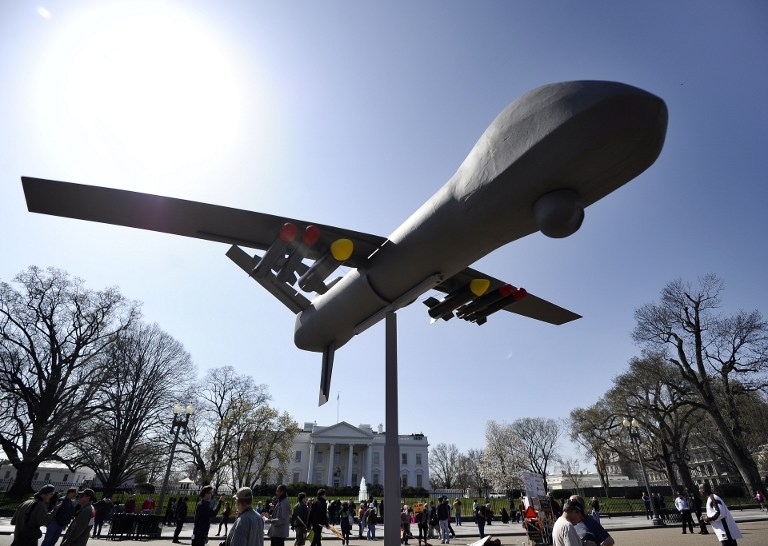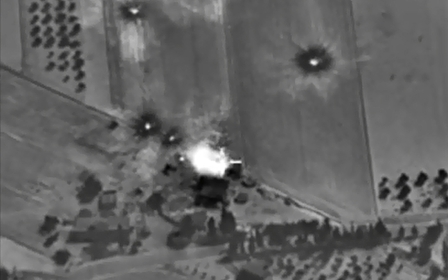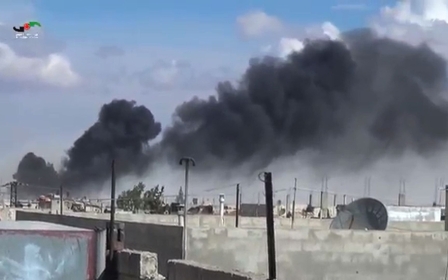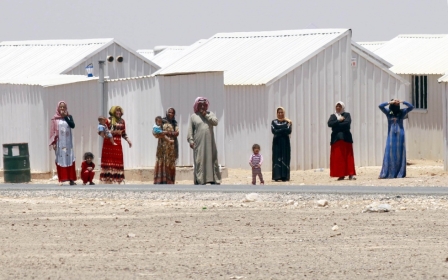ANALYSIS: Drone deals heighten military ties between Israel and Russia

Given heightened tensions over Russia’s support for Iran and the Syrian regime, the recently announced sale of 10 unmanned IAI Searcher 3 drones to Russia seems unusual at face value.
However, Israel’s decision to sell weapons to the country it sees as the principal benefactor of its enemies is just the latest chapter of a long and often complicated history of military cooperation between Israel and Russia.
While this is not the first time in recent history that Israel and Russia have cooperated on UAV technology, the timing could have significant consequences for both the military situation in Ukraine and diplomatic situation at the UN.
In recent weeks, Russia has been flexing its muscle, not only in Ukraine, but also in Syria with an augmented military presence that now includes military aircraft, tanks and combat troops and drones.
The government claims the deployment is intended to fight against the Islamic State militant group (IS), but most analysts agree that the troop build-up is actually a lifeline for a Syrian government increasingly dependent on foreign armies to maintain its grip on the small part of Syria it still controls. So far, reports have come out claiming that Russian strikes have killed anti-IS opposition fighters and civilians as opposed to Moscow’s stated targets.
Recent arms deals between Russia and Iran have also received a substantial amount of media coverage. The sale of Russian S-300 anti-air missiles to Iran earlier this year has been a major factor of the intrigue and negotiations surrounding the Islamic Republic's nuclear programme. The US has expressed concern that the advanced missiles could be used to defend research facilities from American or Israeli aircraft in the event of a strike.
The broader relationship between Iran and Russia has become a political issue on the American right. During the first round of Republican debates, Fox News commentator Megan Kelly brought up the issue of General Qassem Suleimani's 24 July visit to Moscow.
As commander of the much talked about Quds force of the Iranian Revolutionary Guards - designated as a terrorist organization by the US - Suleimani is in charge of external operations, including supporting the Assad government to managing Shia militia in the fight against IS in Iraq. During last month’s anti-Iran deal rally in DC, attendees Donald Trump, Ted Cruz, and Sarah Palin all brought up Israel's safety and Iran's military relationship with Russia as important reasons to oppose negotiations with Iran.
For all the rhetoric about Suleimani and his relationship to Putin, the significant arms deal between Russia and Israel has gone without any scrutiny from American politicians and very little coverage in the media.
Military and diplomatic coordination
Militarily speaking, the drones are likely to be used to feed intelligence on Ukrainian positions to pro-Russian separatists in Donetsk People’s Republic (DNR). This would allow Russia to provide more sophisticated aerial surveillance contingent to their "secret" war in Ukraine without having to commit manned aircraft that would be at risk of being shot down. This is no small development and will greatly improve the strategic position of the separatists. In past conflicts, the introduction of UAV surveillance has proved significant.
Diplomatically, the arms sale fits into the context of Israel cautiously vetting a new relationship with Russia. It is no secret that there is no love lost between Israeli Prime Minister Benjamin Netanyahu and US President Barack Obama, and in a few conspicuous instances Israel appears to be exploring a more cordial relationship with Moscow despite Russia's support for Syria and Iran.
The most obvious manifestation has been Israel's refusal to condemn Russia's annexation of Crimea, which shocked and angered American officials who Israel expects to vote with it at the UN unconditionally.
The recent drone sale is central to this story. In late 2014, Israel considered selling similar vehicles to Ukraine but cancelled the proposed deal due to Russian pressure. Less than a year later, the very same equipment is likely to be used against Ukraine. Israelis serving in the Ukrainian armed forces have speculated that Israel is selling off older variants of its drones to Russia.
This is just the latest chapter in a long and often puzzling history of Russian-Israeli arms deals that stretches back before the state of Israel even existed. As early as 1944, Joseph Stalin, a notorious anti-Semite, saw self-interested potential in the Zionist movement that was fighting against the British mandate in Palestine. Stalin had previously created a "Jewish State" in the far-flung province of Birobidzhan.
The project, which involved Yiddish Soviet monuments and schools, was a thinly veiled attempt to segregate Soviet Jews. In 1948, the soviet satellite state of Czechoslovakia sold a large number of weapons including 86 fighter aircraft to the Jewish Agency, which later became the government of Israel.
The Czechs also provided training to a number of pilots who would later go on to serve in the Israeli air force. Before taking the move to start further targeting Soviet Jewry with a series of show trials, Stalin had seen the support as a strategic move against British dominance of the Middle East.
During the later years of the Cold War, the relationship soured and the governments maintained an adversary relationship until the collapse of the Soviet Union. Diplomatic relations between the two nations has warmed greatly since the fall of communism and have been dramatically strengthened in the past decade.
In 2008, the two nations mutually waived tourist visa requirements. In 2010, Russia and Israel signed a five-year military agreement that focused heavily on UAV sales and operation. During the 2014 Gaza offensive, Russian President Vladimir Putin expressed sympathy for the Israeli position despite the stance of his government at the UN. Israel has ignored EU and US calls for a boycott on certain forms of economic cooperation with Russia.
Israel's drone industry
Economically speaking, Israel’s drone industry is massive for such a small country. There is no serious competition from any country besides the United States in the field of UAVs, and according to the Stockholm International Peace Research Institute the industry has generated at least $4.6bn between 2005 and 2013.
By contrast, Russia has fallen far behind in drone production. Wired magazine speculated that Russia's home-grown technology is at least 20 years behind its American counterparts. Russia’s disadvantage in UAV technology was highlighted after Georgian forces were able to inflict surprisingly high casualties against the invading Russians in 2008.
The push to modernise Russia’s air force lead to the 2010 deal on Israeli and Russia military cooperation. The deal signed between Israel Aerospace Industries (IAI) and the Russian government through Oboronprom, a Russian defence company, was much more than an arms sale, and involved direct military cooperation with Israel training at least 50 Russian officers on UAV operations in Tel-Aviv.
Most interestingly, IAI and Oboronprom agreed to jointly produce UAVs inside Russia. Many of Russia’s new UAVs are a direct result of the programme. Earlier this year, Ukrainian forces shot down and released photos of an the Russian version of an IAI Searcher drone which was presumably acquired or built as part of the 2010 deal.
Given Russia’s close ties to Iran and America’s opposition to Russia’s invasion of Ukraine, the joint UAV program has the potential to be a major source of embarrassment for both countries. Bloomberg News speculated earlier this year about a flurry of backdoor diplomacy between Jerusalem and Moscow with the former giving tacit approval for S-300 sales to Iran in exchange for Russian behind the scenes.
According to diplomatic cables released by Wikileaks, American officials believed that Russia and Israel had previously traded intelligence on Iranian and Georgian technology with Israel providing “data link codes” on Georgia’s Israeli-made Hermes 450 drones. According to the document, American officials believed that Russia provided information on the defences of Iran’s nuclear facilities in exchange.
Additionally there have been high-profile intelligence operations that point to direct cooperation between Israeli and Russian secret services. The 2011 kidnapping of Dirar Abu Sisi, a Palestinian engineer, in eastern Ukraine was speculated to have been coordinated with the SBU, the Ukrainian secret services of the pro-Russian government at the time. Abu Dirar later turned up in Ashkelon prison in Israel.
The speculation of a joint Russian/Israeli operation is very reasonable given the fact that in 2011 the SBU was heavily influenced and infiltrated by Russian intelligence. In 2012, Russia was able to arrange the kidnapping of Russian opposition figure Leonid Razvozzhayev in Kiev. The Russian influence over the security services was so profound at the time that the Ukrainian government refused to open an investigation into the blatant abduction, instead echoing Moscow’s stance that Razvozzhoyev crossed the border voluntarily.
Among Israelis, there is a surprising amount of division about the Ukrainian crisis with reports of Israeli passport holders fighting on both sides of the bloody conflict. Questions of Russian and Ukrainian national origins have placed former Israeli soldiers on opposite sides of the battle. Both sides are launching accusations that Israel is supplying the other side, and both sides are publicly accusing the other side of anti-Semitism.
Not surprisingly, Moscow has re-baptised the Israeli drones with a Russian name, Forpost, which means "outpost". Despite hard rhetoric, there are many logical reasons for Israeli-Russian cooperation. Both countries are suppressing independence movements within the territories they control and both countries use similar rhetoric about Islamic militancy to justify these actions.
Russian is one of the most popular languages among Israel Jews. As of 2014, Russia and its allies Kazakhstan and Azerbaijan are the largest suppliers of oil to Israel. There have been recent reports that Russia and Israel are cooperating on a new line of jet fighters intended for sale to India, which has dramatically improved its relations with Israel since the election in May 2014 of Prime Minister Narendra Modi.
Vladimir Putin has been pushing a very strong line portraying Ukrainians opposed to Russia as Nazis, relying heavily on the completely unrelated history of pro-Nazi Ukrainian militias during the Second World War.
American subsidies
US aid comprises a small percentage of Israel’s economy but it frees up a significant amount of resources for research and development. IAI is at least partially subsidised by the US government, which provided funding for the development of the Iron Dome missile defence system.
American officials have often expressed concern over the proliferation of Israeli technology to third parties, and the Israeli Russian UAV program puts the American government in an especially awkward position.
The US indirectly subsidises Israel’s drone industry at a time when said industry is linked to Russian defence companies. In an interesting twist, Oboronprom is currently facing sanctions from the US government, which in turn is considering legislation to punish people and businesses that boycott Israeli companies.
Russia’s direct entry into the Syrian civil war has resulted in a surprisingly cordial agreement, with Moscow and the Israeli government deciding to tacitly coordinate military actions inside the war-torn country.
The introduction of Russian drones into the Syrian conflict has further complicated the situation. While it is unknown which models are being used inside Syria, the possibility exists that Oboronprom builds the drones that Russia has currently deployed in Syria.
While there is proof that Russia has used Israeli technology against Ukraine, there is as of yet no such evidence from Syria.
That being said, aviation enthusiasts should definitely keep their eyes on the skies to see if Israeli military technology has been introduced into the arsenal of the “axis of resistance”.
New MEE newsletter: Jerusalem Dispatch
Sign up to get the latest insights and analysis on Israel-Palestine, alongside Turkey Unpacked and other MEE newsletters
Middle East Eye delivers independent and unrivalled coverage and analysis of the Middle East, North Africa and beyond. To learn more about republishing this content and the associated fees, please fill out this form. More about MEE can be found here.




